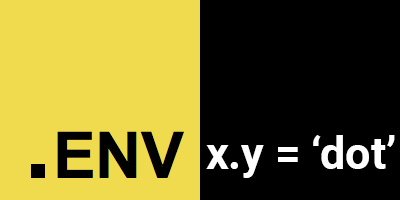https://github.com/roydukkey/dotenv-dot
Dot-notation transformer for dotenv. Transform .env variables into condensed JSON variables for use in nodejs projects.
https://github.com/roydukkey/dotenv-dot
dotenv env environment-variables json user-config user-settings
Last synced: 4 months ago
JSON representation
Dot-notation transformer for dotenv. Transform .env variables into condensed JSON variables for use in nodejs projects.
- Host: GitHub
- URL: https://github.com/roydukkey/dotenv-dot
- Owner: roydukkey
- License: mit
- Created: 2020-07-29T18:25:14.000Z (almost 5 years ago)
- Default Branch: master
- Last Pushed: 2021-01-13T17:05:18.000Z (over 4 years ago)
- Last Synced: 2025-03-15T18:14:10.489Z (4 months ago)
- Topics: dotenv, env, environment-variables, json, user-config, user-settings
- Language: TypeScript
- Homepage:
- Size: 21.5 KB
- Stars: 1
- Watchers: 1
- Forks: 0
- Open Issues: 0
-
Metadata Files:
- Readme: README.md
- Changelog: CHANGELOG.md
- Funding: .github/FUNDING.yml
- License: LICENSE
Awesome Lists containing this project
README
# dotenv-dot

Dotenv-dot adds dot-notation variable transformation on top of [dotenv](http://github.com/motdotla/dotenv). If you find yourself needing to condense environment variables into JSON variables, then dotenv-dot is your tool.
[](https://www.npmjs.com/package/dotenv-dot)
[](https://opensource.org/licenses/MIT)
## Install
```bash
npm install dotenv --save
npm install dotenv-dot --save
```
## Usage
Dot-notation variables are those which contain a dot (.) in their name. Add dot-notation variables to the `.env` file like any other variable.
```dosini
MAIL_CONFIG.service=gmail
[email protected]
MAIL_CONFIG.auth.pass=pass1234
```
Once the dotenv-dot transformer is executed, these variables will be condensed into a new variable named `MAIL_CONFIG`.
```dosini
MAIL_CONFIG='{"service":"gmail","auth":{"user":"[email protected]","pass":"pass1234"}}'
```
#### Transform `process.env` variables
As early as possible in your application, require dotenv and dotenv-dot. Then, execute dotenv-dot after dotenv.
```js
const dotenv = require('dotenv');
const dotenvDot = require('dotenv-dot').transform;
const myEnv = dotenv.config();
const results = dotenvDot(); // only updates `process.env`
```
#### Transform `process.env` and the results of `dotenv.config()`
If you want to update `process.env` and the output of the `dotenv.config()`, include the output as a parameter on the dotenv-dot transformer.
```js
const myEnv = dotenv.config();
const results = dotenvDot(myEnv); // updates `process.env` and `myEnv`
```
#### Transform variables without affecting `process.env`
It is possible to use dotenv without adding variables to `process.env`. Dotenv-dot can also do the same.
```js
const parsedOutput = dotenv.parse(`MAIL_CONFIG.service=gmail
[email protected]
MAIL_CONFIG.auth.pass=pass1234`);
const results = dotenvDot(parsedOutput);
```
If you already have parsed output you may transform it without using dotenv.
```js
const results = dotenvDot({
'MAIL_CONFIG.service': 'gmail',
'MAIL_CONFIG.auth.user': '[email protected]'
'MAIL_CONFIG.auth.pass': 'pass1234'
});
```
### Options
##### debug
Default: `false`
You may turn on logging to help debug why certain keys or values are not being set as expected.
```js
const myEnv = dotenv.config();
require('dotenv-dot').transform(myEnv, {
debug: process.env.DEBUG
});
```
##### ignoreProcessEnv
Default: `false`
You may want to ignore `process.env` when transforming the output of the `dotenv.config()`. When this option is turned on `process.env` will not be consulted or altered.
```js
const myEnv = dotenv.config();
require('dotenv-dot').transform(myEnv, {
ignoreProcessEnv: true
});
```
### How do I use dotenv-dot with `import`?
```js
import * as dotenv from 'dotenv';
import dotenvDot from 'dotenv-dot';
```
Or, if only intending to access `process.env`, the two modules should be loading in this order using their auto-imports:
``` js
import 'dotenv/config';
import 'dotenv-dot/transform';
```
More information about the `import` syntax is available on the [dotenv repository](https://github.com/motdotla/dotenv/blob/master/README.md#how-do-i-use-dotenv-with-import).
*Note:* You may set the `debug` option using the dotenv debug [command line or environment variable](https://github.com/motdotla/dotenv/blob/master/README.md#preload). The `ignoreProcessEnv` option is irrelevant when using the auto-imports.
### How do I add arrays to the `.env` file?
Arrays are added by using numbers to indicate the value's index in the resulting array.
```dosini
THINGS.0='Was eaten by his others'
THINGS.1='Thing One'
THINGS.3='Wayward Thing Two'
```